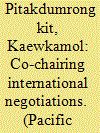| Srl | Item |
| 1 |
ID:
141624


|
|
|
|
|
| Summary/Abstract |
This paper studies the roles of co-chairs in international negotiations. This study attempts to fill the research gap by scrutinizing co-chairs' effectiveness, defined as an ability to shape agreement details in one's direction, to better understand chairs' and co-chairs' influence in negotiations. I argue that a co-chair's effectiveness is not a function of resource possession, but is rooted in its resource management, or ability to convert the existing resources into bargaining influence. To validate my argument, I analyze the Chiang Mai Initiative Multilateralization (CMIM) negotiation rounds from 2005 to 2010, focusing on the members' financial contributions and vote shares.
|
|
|
|
|
|
|
|
|
|
|
|
|
|
|
|
| 2 |
ID:
174653


|
|
|
|
|
| Summary/Abstract |
Since the 1997 Asian financial crisis, East Asia’s ASEAN+3 states have built the second-largest regional emergency liquidity fund in the world, the Chiang Mai Initiative Multilateralization (CMIM). With a total commitment of $ 240 billion to aid member states facing a currency crisis, CMIM can provide more funds to members than the International Monetary Fund (IMF). Nonetheless, CMIM continues to be functionally subordinate to IMF decisions. This may now be changing following the 2011 creation of the ASEAN+3 Macroeconomic Research Office (AMRO) as a regional mechanism to manage surveillance and design of CMIM lending programs. The ability to delegate surveillance and program design to an independent body is a crucial prerequisite to ending CMIM’s subordination to the IMF, and AMRO seeks to ensure such autonomy through its institutional design. This article analyzes AMRO’s progress toward autonomy, using indicators of effective delegation drawn from organizational theory and newly available information and data on AMRO.
|
|
|
|
|
|
|
|
|
|
|
|
|
|
|
|